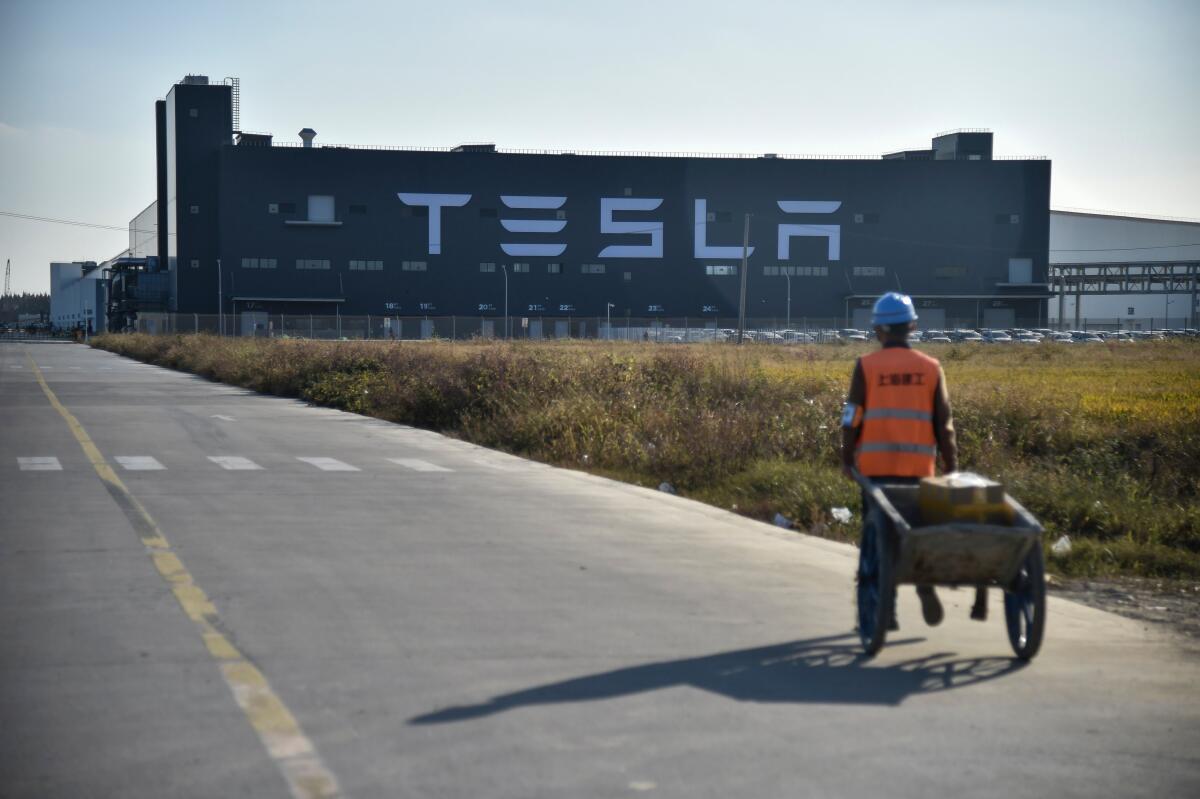Tesla nails deliveries target, becomes world’s most valuable automaker

- Share via
Tesla Inc. displaced Toyota Motor Corp. as the world’s most valuable automaker, underscoring investor enthusiasm for a company trying to transform an industry that’s relied on internal combustion engines for more than 130 years.
Shares of Tesla, which have nearly tripled since the start of the year, climbed about 25% from Monday through close of trading on Thursday, giving Tesla a market capitalization of $224.1 billion, surpassing Toyota’s $204.9 billion.
Chief Executive Elon Musk has ignored or broken many of the established auto industry’s rules and norms in the 10 years since he took Tesla public, selling cars online and assembling vehicles in high-cost California. Although his company’s value has soared, there remains a gulf in the scale of his company and the world’s biggest car manufacturers.
Tesla produced 103,000 vehicles in the first quarter, or about 4% of the almost 2.4 million made by Toyota, which built its brand on affordability and reliability backed by innovations in large-scale manufacturing.
On Thursday, Tesla reported a sequential gain in quarterly deliveries that seemed improbable weeks ago, sending its stock surging still higher.
The electric-car maker handed over 90,650 cars to customers in the three months that ended in June, exceeding analysts’ average estimate for about 83,000 in a Bloomberg News survey. Tesla delivered about 88,400 vehicles in the first quarter. Tesla shares jumped $89.03, or 8%, to $1,208.66 on the news.
Musk overcame a roughly seven-week shutdown of Tesla’s California car plant by ramping up output at its new factory near Shanghai. Localizing production in China is helping reach more customers in the world’s largest electric vehicle market by lowering prices. The period also was the first full quarter of deliveries for the Model Y crossover, which Musk has predicted will become Tesla’s top seller.
Although deliveries were down almost 5% from a year earlier, that’s a strong showing relative to the declines other automakers sustained because of the global pandemic that decimated vehicle demand in key markets.
“Tesla is winning because they have a product that is measurably better than both gas and electric competitors,” Gene Munster, a managing partner at venture capital firm Loup Ventures, wrote in a report. “It’s becoming more and more difficult to envision a scenario in which legacy automakers will find a way to meaningful expand the small share of EVs that they have today.”
The next big question for Musk, 49, is whether the deliveries were enough to earn a quarterly profit. He suggested to employees this week that avoiding a loss was possible.
“Breaking even is looking super tight,” the CEO wrote to staff in an email seen by Bloomberg. “Really makes a difference for every car you build and deliver. Please go all out to ensure victory!”
Musk has sent many end-of-quarter emails to rally employees and signal to investors, but Tesla hasn’t always followed through on his optimism. The then-record 97,000 deliveries Tesla reported for the three months that ended in September fell short of the 100,000 mark he floated in an email to workers.
If Musk is on the mark this time, Tesla could qualify for inclusion in the Standard & Poor’s 500 index. To be eligible, the company needs to report positive quarterly earnings under generally accepted accounting principles. Beyond sales of cars, Tesla can recognize revenue related to its automated driving system, and it also sells emissions credits to other automakers.
“With strong Q2 volumes, GAAP profitability is now in focus and appears achievable, which could lead to inclusion in the S&P 500,” Ben Kallo, an analyst at Robert W. Baird who rates Tesla the equivalent of a hold, wrote in a report.
Analysts on average project Tesla will report a loss of about $1.80 a share on a GAAP basis for the quarter, according to data compiled by Bloomberg. But higher-than-projected vehicle deliveries would make profitability a “less radical” idea, Dan Levy, a Credit Suisse analyst, wrote in a report Monday.
Tesla became the world’s second-most valuable automaker in January, when it surpassed Volkswagen. It’s now worth more than twice the German giant.
After pioneering gas-electric vehicles with the Prius hybrid, Toyota was late to shift to fully electric autos and has wagered heavily on hydrogen fuel cells. The company is now making a series of high-profile investments in EVs and self-driving cars. The manufacturer has forecast an 80% plunge in profit this year and expects it could take until the first half of next year before the auto market recovers to pre-pandemic levels.
Toyota’s market valuation includes the 14.3% of shares that Toyota itself holds as treasury stock, worth around $30 billion. Tesla doesn’t hold any treasury shares, according to data compiled by Bloomberg.






